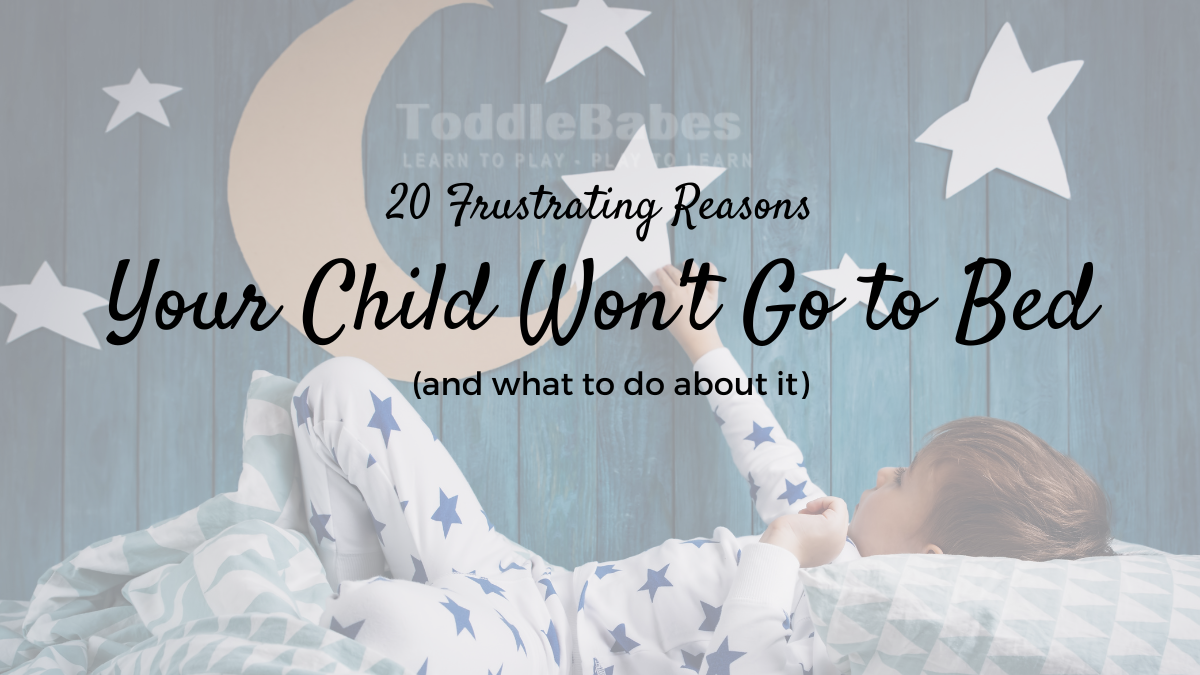
11 Great Reasons Children Should Do Chores

9 Reasons Good Sleep is Important

There are so many reasons a child won’t go to bed. From the moment our babies are born, we spend a huge amount of time looking into good sleep routines, sleep training, getting our little ones to go to sleep, and then sleeping through the night. We begin to think a lot about the importance of good sleep, we fret and grumble when we have an interrupted night, and we are told to take naps if we can to bolster our sleep quota.
We are hit with adverts telling us to use special mattresses and pillows, a certain type of light to use or not to use, not to use electronics close to bedtime (guilty as charged), and to create a soothing and calming bedroom environment. In this post, I’ll be discussing the benefits of good sleep for both you and your child and why they might not want to go to bed.
As parents, we all want our children to get a good night’s sleep (and to go to bed without a hassle). As adults, we know how important sleep is, and how essential it is to good health and vitality. I am a big believer in bedtime routines and ensuring my children maintain a predictable and calming bedtime. As I mentioned before in 18 ridiculous reasons why children wake at night my children have followed the same routine since they were 6 months old.
This does not mean they are little angels and that they happily drift off to sleep each night. It also does not mean that they stay asleep all night, but it does mean that bedtime struggles are far less frequent and my children have little to no fallout from late nights.
It also doesn’t mean that they don’t “try it on” at bedtime. Even though they know the routine, they know what’s expected, and they understand what is expected, they still like to delay bedtime if they can. Why they do this is a mystery. I think it is a fear of missing out, the allure of what might happen while I’m asleep, the intrigue of what grown-ups do when I’m asleep…
After chatting with some other parents, I found that we all have had similar excuses for not going to sleep, from our children. Below are the reasons my own children have given me over the years.
Table of Contents
Reasons Your Child Won’t Go To Bed.
- My bed is too cold/hot
- My feet are cold.
- I need to go to the toilet.
- My tummy/ear/toe/nose etc etc etc is sore.
- My toenails need cutting.
- I just need to (insert whatever it is they just have to do here).
- I’m thirsty/hungry.
- I’m not tired (often said through a yawn).
- But you’re still up. Grrr, this one is my least favourite. Yup, I’m an adult. When the kids are in bed, that’s “me time”. My children know not to try this one anymore as it’s met with my most angry responses.
- I want to cuddle you. Yes, well…this is one of the most difficult to say no to. Because, actually, I also want a cuddle. But this then brings the drama of if I have a long cuddle with one, then the others want the same. I’ve actually had to make it a “taking turns” thing in my house so that they all feel it is fair and they are not allowed to ask me on a night when it is their sibling’s turn for extra cuddle time. This doesn’t mean I won’t cuddle the others, it just means one gets slightly more that night.
- I haven’t packed my school bag.
- I forgot that I need to finish my homework for tomorrow.
- I just want to read one more chapter.
- The sun is still up. This can be a really trying one in the summer months. I just tell mine: The sun can’t read the time, you can!
- It’s not dark enough for bedtime. Often followed by, It’s too dark in my bedroom.
- I can’t find my bear/rabbit/dinosaur etc.
- You and Daddy are talking too loudly.
- They initiate a conversation about friendship or feelings or something that makes you feel you need to stay and resolve it before sleep. My daughter often tells me about issues with friends just after I’ve said goodnight…and an hour later we finally finish the discussion and she goes to sleep. This one is tricky because one is never really sure if it is as “bad” as it seems or if the late hour and the place between sleep and awake and nighttime tiredness exacerbates or intensifies those emotions.
- They initiate a conversation about upcoming events. Like their birthday party in 9 months’ time!
- You forgot to give me a squeeze, tuck me in, give me a kiss, say goodnight….etc
Some of these seem funny when written down and others are just plain annoying, but all result in negative emotions at bedtime. To stop this from becoming a daily problem, I have taken the time to explain to my children the effects that a lack of sleep has on their emotional, social, and physical well-being. We’ve had talks about how sleep improves mood, how it helps our memories and improves concentration. We’ve discussed how our bodies grow and repair themselves while we sleep and that it gives our bodies a chance to de-stress.
I often remind them of these when they are playing up at bedtime. So often in fact, that my 5-year-old will say I’m going to sleep mum, I want to grow a bit more so I can be taller or I’ll be told…I did hard work at school, so I’m going to sleep so my brain has time to organise the new information and can help me remember it in tomorrow’s lesson.
Sleep Requirements for Age 0-5 years
Sometimes it is helpful to know about the average baby’s sleep requirements so that you can stop comparing them to friends’ children and wondering if your little one is different or abnormal. Sleep researchers have discovered that babies’ sleep needs differ at different ages and of course that babies are individuals, just like adults, and have different personal sleep needs.
This list is meant to be a guide, so when looking at it, bear in mind that babies differ greatly and that it does not necessarily mean there is something wrong with your baby if he sleeps much more or much less than the average.
A healthy baby will take as much sleep as she needs, so don’t worry that she is coming to harm.
Average Number of Hours Needed:
Age During the DAY At NIGHT
1 week 8 hours 8 hours 30 min
4 weeks 6-7 hours 8-9 hours
3 months 5 hours 10 hours
6 months 4 hours 10 hours
9 months 2-3 hours 11 hours
12 months 2 hours 30 min 11-12 hours
2 years 1 hour 15min 11-12 hours
3 years 1 11-12
4 years none 11-12
5 years none 11-12
Notice that as they get older the daytime nap gets shorter and sometimes falls away entirely. However, if your 4-year-old needs a nap, it is fine to continue to do so…just because the average child may not need it, you should look at your own child’s individual needs. If she is happy, alert, and thriving, then the amount she is taking is sufficient. If she seems grumpy and irritable, then perhaps she needs more.
In our fast-paced and demanding world, it is important to recognize that sleep is not a luxury but a vital necessity for our physical, mental, and emotional well-being. By valuing and prioritizing sleep, we can unlock its numerous benefits, allowing us to lead healthier, more productive, and fulfilling lives.
10 Ways to encourage toddlers to Go to Sleep
Encouraging toddlers to go to sleep can sometimes be a challenge, but with a consistent routine and a few strategies in place, you can create a sleep-friendly environment and help them establish healthy sleep habits. Here are some suggestions to encourage toddlers to go to sleep:
- Establish a consistent bedtime routine: Create a predictable routine leading up to bedtime that includes calming activities such as a warm bath, reading a bedtime story, or listening to soft music. A consistent routine signals to the child that it’s time to wind down and prepares them for sleep.
- Set a regular sleep schedule: Maintain a consistent bedtime and wake-up time, even on weekends. Having a regular sleep schedule helps regulate their body clock and makes it easier for them to fall asleep at night.
- Create a comfortable sleep environment: Ensure the toddler’s sleep environment is dark, quiet, and at a comfortable temperature. Consider using blackout curtains, white noise machines, or a favourite stuffed animal or blanket for added comfort and security.
- Limit stimulating activities before bedtime: Avoid activities that can overstimulate the toddler, such as vigorous play, screen time, or consuming sugary foods or drinks close to bedtime. Instead, encourage calm and quiet activities that promote relaxation.
- Encourage physical activity during the day: Engage toddlers in age-appropriate physical activities during the day to help them expend energy and promote better sleep at night. However, avoid vigorous exercise too close to bedtime, as it may make it harder for them to wind down.
- Provide a transitional object: Some toddlers find comfort in having a special object, such as a stuffed animal or a blanket, to help them feel secure and relaxed when going to sleep.
- Offer reassurance and comfort: If the toddler is resistant to going to sleep, provide reassurance and comfort without giving in to demands that delay bedtime. Offer gentle reminders that it’s time to sleep and be consistent with your approach.
- Avoid stimulating or sugary foods close to bedtime: Opt for nutritious meals and snacks throughout the day and avoid giving sugary or caffeinated foods and drinks close to bedtime, as they can interfere with falling asleep.
- Be patient and consistent: Establishing healthy sleep habits takes time and consistency. Be patient and stick to the routine you’ve established, even if there are initial challenges. Consistency is key in helping toddlers understand and adapt to bedtime expectations.
Remember, every child is unique, so it’s essential to find an approach that works best for your toddler. If you continue to experience significant challenges with your child’s sleep, it may be helpful to consult with a paediatrician or sleep specialist for additional guidance and support.
If your child doesn’t want to go to bed, take the time to talk about sleep and how good it is for them, especially at a young age. You’ll be impressed with how much they understand and how they take it on board. If you can get them to see how sleep will make them more clever, stronger, healthier, and less moody, I guarantee you they’ll soon quit their bedtime shenanigans.
Here are some really good reasons for getting a good night’s sleep:
Reasons Why Sleep is Important
We are obsessed with sleep. I mean, how many times can you honestly say your last words to your child or partner are “Sleep well” and the first ones in the morning are “How’d you sleep?” or “Did you sleep okay?” We talk about our sleep with friends. It is such a big part of everything. It affects our mood, our attitude about everything, our ability to function effectively in our daily lives, and our health.
We spend time worrying about sleep. Reading articles about sleep and wondering if we and our kids are getting too much, too little or if the quality of our sleep is good enough. I even wear a sleep tracker to bed…it, along with an app on my phone, tells me how much time I am in light sleep, deep sleep, and REM sleep. It buzzes me when it’s bedtime and time to get up. It also has a “coach” feature that gives me hints and tips on how to improve my sleep.
So why is sleep so important? What benefits does it hold for us?
Sleep improves memory
Even though your body shuts off and recuperates while you sleep, your mind is surprisingly busy while you snooze. During sleep, you can strengthen memories or “practice” skills learned while you were awake (it’s a process called consolidation). This means sleep is especially important when you are in a learning environment or acquiring new skills.
Getting enough sleep helps your brain remember what you learn. This is true for adults and children so if you’re studying, it’s sensible to get some sleep and not to pull all-nighters!
Sleep helps keep your body healthy
Inflammation is linked to heart disease, stroke, diabetes, arthritis, and premature ageing. Research indicates that people who get less sleep—six or fewer hours a night—have higher blood levels of inflammatory proteins than those who get more.
- Muscles, bones, and skin can grow
- Muscles, skin, and other parts can fix injuries
- The body can stay healthy and fight sickness
- Fight sickness so you stay healthy
As a Psoriasis sufferer, not all the time, but I do experience flare-ups. One of the things my dermatologist said was to make sure I got enough sleep and tried to reduce inflammation in my body. Having taken this seriously (hence the sleep tracker) I have been clear now for almost 2 years! I attribute this to a huge overhaul of my diet and making an effort to sleep better and exercise more.
Sleep helps you be more creative
Sleep is a vital process that goes beyond mere rest and rejuvenation for the body. It plays a crucial role in various cognitive functions, including memory consolidation and creative thinking. When you sleep, your brain engages in a series of intricate activities that enhance your ability to be creative.
One of the essential functions of sleep is memory consolidation. During the different stages of sleep, your brain processes and strengthens the memories and information acquired during wakefulness. It filters through the vast amounts of data collected throughout the day, sorting and organizing them into relevant networks. This process allows for more efficient storage and retrieval of information, contributing to enhanced memory and knowledge integration.
Additionally, sleep facilitates the reorganization and restructuring of memories. During rapid eye movement (REM) sleep, which is characterized by vivid dreaming, your brain actively synthesizes and connects different fragments of information, creating new associations and insights. This reorganization of memories can lead to novel connections and perspectives, promoting creativity.
Moreover, a well-rested brain is better equipped to solve problems and think creatively. When you are sleep-deprived, cognitive functions such as attention, focus, and divergent thinking tend to suffer. On the other hand, getting sufficient sleep ensures that your brain is operating optimally, enabling you to approach challenges with clarity and flexibility. This cognitive flexibility allows for the generation of unique ideas and the ability to think outside the box.
Sleep also promotes emotional regulation, which is essential for creativity. When you are well-rested, your mood stabilizes, reducing stress and anxiety. This emotional balance creates a conducive environment for creative thinking and innovation. In contrast, sleep deprivation can impair emotional regulation, hindering the ability to think creatively and inhibiting the generation of new ideas.
Furthermore, during sleep, the brain undergoes a process of synaptic pruning, eliminating unnecessary connections while strengthening relevant ones. This pruning helps streamline neural pathways, enhancing the efficiency of information processing. As a result, a well-rested and organized brain can handle complex tasks more effectively, allowing for improved problem-solving skills and creative thinking.
In conclusion, sleep is not only essential for physical health but also plays a vital role in cognitive processes, including creativity. During sleep, the brain consolidates memories, reorganizes information, and enhances problem-solving abilities. A well-rested and organized brain is more capable of generating new ideas and approaching challenges with a fresh perspective. Prioritizing sleep can significantly contribute to unleashing your creative potential and fostering innovation in various aspects of life.
Sleep helps improve athletic performance
Sleep plays a critical role in optimizing athletic performance. Athletes, whether professional or amateur, can greatly benefit from prioritizing sufficient sleep to enhance their physical abilities and overall well-being.
One of the key ways sleep improves athletic performance is through physical recovery. During sleep, the body undergoes various restorative processes that aid in repairing damaged tissues, replenishing energy stores, and promoting muscle growth. This recovery period allows the body to heal from the stresses and strains of intense physical activity, reducing the risk of injury and enhancing overall athletic performance.
Moreover, sleep is closely linked to hormonal regulation, which is crucial for athletic performance. Hormones such as growth hormone, testosterone, and cortisol play essential roles in muscle development, tissue repair, and metabolism. Studies have shown that sleep deprivation can disrupt the delicate balance of these hormones, negatively affecting muscle recovery, muscle strength, and endurance. On the other hand, adequate sleep helps optimize hormone levels, contributing to improved athletic performance.
In addition to physical recovery, sleep plays a vital role in cognitive functioning, which is crucial for sports performance. During sleep, the brain consolidates newly acquired motor skills and procedural memories, enhancing coordination, reaction time, and motor performance. These cognitive benefits translate into improved agility, accuracy, and overall sports proficiency.
Furthermore, sleep is closely tied to mental and emotional well-being, which can significantly impact athletic performance. Sufficient sleep promotes mood stability, reduces stress, and enhances mental resilience. Athletes who are well-rested are better equipped to manage pressure, stay focused, and make sound decisions during training or competition. On the other hand, sleep deprivation can lead to increased irritability, impaired judgment, and decreased motivation, all of which can hinder athletic performance.
Studies have shown the direct impact of sleep on athletic performance. For example, a study conducted at Stanford University with football players found that increasing sleep duration to at least 10 hours per night led to notable improvements in sprint time, reduced fatigue, and increased stamina. Similar research in other sports, such as basketball and swimming, has also demonstrated the positive effects of sleep on performance metrics such as shooting accuracy and swim times.
Sleep is a fundamental component of athletic performance. Adequate sleep enhances physical recovery, supports hormonal regulation, improves cognitive function, and promotes mental well-being. By prioritizing sleep, athletes can optimize their training efforts, reduce the risk of injuries, and perform at their best. Recognizing the value of sleep as an essential pillar of athletic success can lead to significant improvements in overall performance and overall quality of life.
Sleep Improves your academic attainment
Sufficient and quality sleep is crucial for academic attainment and cognitive functioning. Research has consistently shown that inadequate sleep and sleep-related problems can negatively impact attention, learning, and overall academic performance.
One area of concern is sleep-disordered breathing, which includes conditions like snoring and sleep apnea. These conditions can lead to interruptions in breathing during sleep, resulting in fragmented and poor-quality sleep. A study published in the journal Sleep in 2010 focused on children between the ages of 10 and 16 and found that those with sleep-disordered breathing were more likely to experience difficulties with attention and learning. The study authors highlighted the potential for significant functional impairment at school as a consequence of these sleep-related issues.
Interrupted or insufficient sleep affects attention and concentration, making it challenging for students to stay focused in the classroom. Attention is a crucial cognitive process necessary for absorbing information, engaging in class discussions, and completing academic tasks effectively. When sleep-deprived, students may experience lapses in attention, decreased alertness, and reduced ability to process and retain information. These factors can impede their academic progress and hinder their overall learning experience.
Sleep also plays a vital role in memory consolidation and learning retention. During sleep, the brain processes and consolidates information acquired during wakefulness, enhancing memory formation. This process involves the transfer of information from short-term to long-term memory, making it easier to retrieve and apply knowledge when needed. Insufficient sleep disrupts this consolidation process, making it more challenging for students to retain and recall information effectively.
Sleep deprivation can impact cognitive functions such as problem-solving, critical thinking, and creativity, all of which are essential for academic success. When sleep-deprived, students may struggle to approach complex academic tasks, analyze information, and generate innovative ideas. Lack of sleep can impair cognitive flexibility, which is the ability to adapt and switch between different cognitive processes, hindering academic performance.
Sleep deprivation and sleep-related problems can contribute to daytime sleepiness, fatigue, and decreased motivation. These factors can affect students’ engagement and participation in academic activities, leading to decreased productivity and performance. Sleep-deprived students may feel less motivated to complete assignments, study, or actively participate in class discussions, further impacting their academic attainment.
To improve academic performance, it is crucial for students to prioritize sleep hygiene and establish healthy sleep habits. This includes maintaining a consistent sleep schedule, creating a conducive sleep environment, practising relaxation techniques before bed, and avoiding stimulating activities close to bedtime. By ensuring sufficient and restful sleep, students can enhance their attention, memory, cognitive abilities, and overall academic achievement.
Sleep plays a vital role in academic attainment. Sleep-related problems, such as sleep-disordered breathing, can negatively impact attention, learning, and overall functional performance at school. Adequate sleep is essential for attention, memory consolidation, cognitive functions, and motivation, all of which contribute to successful academic performance. By recognizing the importance of quality sleep and adopting healthy sleep habits, students can optimize their learning potential and improve their academic outcomes.
Sleep improves attention
Ever noticed how children behave after a poor night? A lack of sleep can result in ADHD-like symptoms in kids. Children don’t seem to react the same way to a lack of sleep as adults do. Adults get sleepy, kids tend to get hyperactive.
Sleep plays a crucial role in attention, concentration, and the ability to stay focused, particularly in children of school-going age. Research has consistently shown a strong relationship between sleep duration and attention-related behaviours, emphasizing the importance of adequate sleep for optimal cognitive functioning.
A study published in the journal Pediatrics in 2009 focused on children aged 7-8 and examined the effects of sleep duration on attention and behaviour. The study found that children who consistently received less than eight hours of sleep per night were more likely to exhibit hyperactivity, inattention, and impulsivity. These findings highlight the significant impact of insufficient sleep on attention-related behaviours in children.
When children are well-rested, their ability to pay attention and concentrate improves significantly. Sufficient sleep provides the brain with the necessary rest and recovery it needs to function optimally. During sleep, the brain consolidates information and processes it for later use, strengthening neural connections that are essential for attention and concentration. Inadequate sleep disrupts this process, making it more challenging for children to focus and maintain attention during academic tasks or other activities.
Tiredness resulting from insufficient sleep can seriously affect a child’s school day. Fatigue and sleepiness can impair cognitive functioning, leading to decreased alertness, decreased processing speed, and difficulties with memory and problem-solving. These factors can hinder a child’s ability to engage in classroom activities, follow instructions, and perform at their best academically. Consequently, their academic performance may suffer, and they may struggle to keep up with the demands of their schoolwork.
Moreover, sleep deprivation can also impact emotional regulation and mood stability, which can further impact attention and concentration. When children are sleep-deprived, they may experience irritability, mood swings, and difficulty managing their emotions. These emotional disruptions can interfere with their ability to stay focused and engage in learning effectively.
Establishing healthy sleep habits and ensuring sufficient sleep is crucial for optimizing attention and concentration in children. Consistency in sleep routines, creating a conducive sleep environment, and practising good sleep hygiene can contribute to improved sleep quality and duration. Setting regular bedtimes, minimizing exposure to stimulating activities before bed (such as screen time), and promoting a relaxing bedtime routine can help children wind down and prepare for a restful night’s sleep.
Sleep plays a vital role in improving attention, concentration, and the ability to stay focused, particularly in school-going-age children. Insufficient sleep can lead to hyperactivity, inattention, and impulsivity. By prioritizing adequate sleep and establishing healthy sleep habits, children can optimize their attentional abilities, enhance their academic performance, and have a more productive and successful school day.
Sleep aids a healthy weight
Sleep plays a crucial role in maintaining a healthy weight and managing appetite. Numerous studies have highlighted the connection between sleep duration, hormone regulation, and appetite control, emphasizing the impact of sleep on weight management and food choices.
One of the key factors contributing to the relationship between sleep and weight is the regulation of appetite hormones. When you experience insufficient sleep, certain hormones involved in appetite regulation become imbalanced. Specifically, the hormone ghrelin, which stimulates appetite, increases, while leptin, the hormone that signals fullness, decreases. This hormonal imbalance can lead to increased feelings of hunger and cravings, especially for high-calorie, sugar-laden foods that provide quick energy.
The desire for sugary foods as a result of sleep deprivation is often driven by the body’s attempt to compensate for the lack of energy caused by tiredness. When you’re sleep-deprived, you may seek out sugary snacks to combat fatigue and temporarily boost energy levels. However, the energy spike from consuming sugary foods is short-lived and can result in a subsequent crash, leading to a cycle of craving more sugar to maintain energy levels. This pattern of consuming unhealthy, high-calorie foods can contribute to weight gain and negatively impact overall health.
Moreover, sleep deprivation can disrupt the balance of other hormones involved in metabolism and weight regulation, such as insulin. Insufficient sleep can impair insulin sensitivity, leading to difficulties in glucose metabolism and increased risk of insulin resistance. These metabolic disruptions can contribute to weight gain and increase the likelihood of developing conditions like obesity and type 2 diabetes.
Furthermore, inadequate sleep can affect the brain’s reward centres, making unhealthy food choices more tempting. Sleep deprivation can lead to reduced activity in the prefrontal cortex, which is responsible for decision-making and impulse control. This can result in a greater propensity to indulge in unhealthy, calorie-dense foods, further contributing to weight gain and unhealthy eating patterns.
In addition to hormonal and neurological factors, insufficient sleep can also impact physical activity levels. When you’re sleep-deprived, you may feel less motivated or have reduced energy to engage in exercise or physical activity. This sedentary behaviour can contribute to weight gain and hinder weight management efforts.
To promote a healthy weight and improve overall well-being, it is important to prioritize sufficient and quality sleep. Establishing a regular sleep schedule, creating a comfortable sleep environment, and practising good sleep hygiene can contribute to better sleep habits. Adequate sleep helps regulate appetite hormones, supports healthy food choices, and provides the energy and motivation needed to engage in regular physical activity.
Sleep plays a vital role in maintaining a healthy weight. Sleep deprivation can disrupt appetite-regulating hormones, increase cravings for unhealthy foods, and impact metabolic function. Prioritizing sufficient sleep and adopting healthy sleep habits can help manage appetite, support weight management, and promote overall health.
So if you are looking to maintain a healthy weight or to lose some weight, go to bed!
Sleep lowers stress levels
Sufficient and restful sleep plays a vital role in lowering stress levels and promoting overall well-being. Sleep provides a much-needed opportunity for the body and mind to relax, recharge, and repair, effectively reducing the impact of stress on our lives.
When we experience stress, our bodies undergo physiological changes, including the release of stress hormones like cortisol and adrenaline. These hormones can increase heart rate, and blood pressure, and activate the body’s “fight or flight” response. Prolonged or chronic stress can have detrimental effects on our cardiovascular health and increase the risk of developing conditions such as heart disease.
Sleep acts as a natural counterbalance to stress. During sleep, the body undergoes various restorative processes that help regulate stress hormones and promote relaxation. Sufficient sleep allows cortisol levels to decrease, restoring hormonal balance and reducing the physiological markers of stress.
In addition to hormonal regulation, sleep plays a critical role in mental and emotional well-being. Sleep deprivation can impair cognitive function, memory, and emotional regulation, making it more challenging to cope with stressors effectively. On the other hand, getting enough sleep enables the brain to process emotions and experiences, facilitating emotional resilience and better stress management.
Sleep provides a much-needed break from the demands and pressures of daily life. It allows us to disconnect from work, responsibilities, and external stressors, creating a mental and physical space for relaxation and rejuvenation. Sleep provides an opportunity for the mind to process and integrate information, contributing to problem-solving abilities and a clearer perspective when facing stressors.
Establishing a regular bedtime routine and creating a sleep-conducive environment are important practices for reducing stress. Taking time to unwind before bed, engaging in relaxing activities such as reading, practising mindfulness, or taking a warm bath, can help signal the body and mind that it’s time to relax and prepare for sleep. Creating a comfortable sleep environment, free from distractions and promoting a cool, dark, and quiet atmosphere, can further enhance the quality of sleep and stress reduction.
It’s important to note that stress itself can sometimes interfere with sleep, creating a cycle of sleep deprivation and increased stress. Implementing stress management techniques throughout the day, such as exercise, deep breathing exercises, and mindfulness practices, can help alleviate stress and promote better sleep.
In conclusion, sleep plays a crucial role in lowering stress levels and promoting overall well-being. By prioritizing sufficient sleep, creating a bedtime routine, and fostering a sleep-conducive environment, we provide our bodies and minds with the necessary time to recharge, repair, and disconnect from the stresses of daily life. Adequate sleep supports hormonal regulation, enhances emotional resilience, and provides a foundation for effective stress management.
I try to go to bed at the same time each night and my body is so in tune with my bedtime now, that I feel myself falling asleep and I know the time without checking my clock. This can be very annoying..uh..embarrassing when I head out for the rare night out. Yawning at 10:30 is not a good look!
Sleep improves your mood
Sleep plays a crucial role in regulating mood and emotional well-being. A good night’s sleep can significantly improve one’s mood, increase emotional stability, and enhance social interactions with friends, family, and colleagues.
When we are sleep-deprived or have poor sleep quality, our emotional state can be negatively affected. Lack of sleep can contribute to irritability, mood swings, and heightened emotional reactivity. Small frustrations may feel magnified, and it becomes more challenging to regulate emotions effectively. This can lead to increased anxiety, stress, and a generally negative mood.
On the other hand, getting sufficient and restful sleep allows the brain and body to recover, reset, and restore balance. During sleep, the brain processes emotions and consolidates experiences, providing a chance for emotional regulation and resilience. Adequate sleep helps to regulate the neurotransmitters and hormones involved in mood regulation, such as serotonin and cortisol, promoting emotional stability and a positive mood.
In addition, sleep deprivation can impair cognitive function and decision-making processes, which can further contribute to mood disturbances. When we are sleep deprived, our ability to think clearly and problem-solve effectively is compromised, making it harder to cope with stressors and regulate emotions. This can lead to heightened anxiety and irritability, further impacting mood.
Sleep is closely linked to mental health, and poor sleep is associated with an increased risk of developing mood disorders such as depression and anxiety. Inadequate sleep can disrupt the delicate balance of neurotransmitters in the brain, contributing to the development or exacerbation of mood disorders. Conversely, prioritizing good sleep habits can be a preventative measure against the onset of such conditions and can support overall mental well-being.
By ensuring adequate sleep, individuals can experience improved emotional regulation, enhanced mood, and increased tolerance levels. Good sleep provides the energy and resilience needed to cope with daily stressors and interact more positively with others. It allows individuals to approach social interactions with a clearer mind, better communication skills, and greater emotional stability.
Establishing a consistent sleep schedule, creating a relaxing bedtime routine, and maintaining a sleep-conducive environment is essential for optimizing sleep quality and improving mood. Avoiding stimulating activities and electronic devices close to bedtime, practising relaxation techniques such as deep breathing or meditation, and creating a calm and comfortable sleep environment can all contribute to better sleep and enhanced mood.
Sleep plays a crucial role in improving mood and emotional well-being. Good sleep allows for emotional regulation, enhances emotional stability, and promotes positive interactions with others. By prioritizing sufficient and restful sleep, individuals can experience improved mood, increased tolerance, and better overall mental health.
If those are not enough superb reasons to go to bed, then I don’t know what are! I recommend snuggling down in your carefully lit/darkened room, on your perfectly chosen mattress and pillow, at the exact right temperature, far from electronics, at a time that offers you the best chance for a full 7 hours of sleep. Perform the rituals that help you relax, prepare, and head to the land of nod in the best frame of mind.
9 Reasons Good Sleep is Important
In conclusion, a good night’s sleep offers numerous benefits that are essential for our overall well-being. From physical health to cognitive function, emotional stability to creative thinking, sleep plays a fundamental role in optimizing various aspects of our lives.
Physically, adequate sleep allows our bodies to repair and regenerate, promoting the optimal functioning of vital systems. It boosts immune function, supports cardiovascular health, and aids in maintaining a healthy weight. With sufficient sleep, we have more energy, improved physical performance, and better coordination.
Cognitively, sleep is crucial for optimal brain function. It enhances memory consolidation, information processing, and learning abilities. Quality sleep enables clearer thinking, improved focus, and enhanced problem-solving skills. It also supports creativity and the ability to generate innovative ideas.
Emotionally, sleep plays a significant role in regulating mood and emotional well-being. It helps stabilize emotions, reduces irritability and anxiety, and enhances emotional resilience. With a good night’s sleep, we are better equipped to cope with stress, maintain positive relationships, and approach challenges with a more balanced perspective.
Furthermore, sleep supports mental health by reducing the risk of developing mood disorders such as depression and anxiety. It contributes to overall psychological well-being, improving our ability to cope with daily stressors and increasing our overall quality of life.
Sleep also benefits our social interactions. When well-rested, we have greater patience, empathy, and communication skills. We are more attentive and responsive to others, which fosters stronger connections and healthier relationships.
To reap the benefits of a good night’s sleep, it is essential to prioritize healthy sleep habits. Establishing a consistent sleep schedule, creating a relaxing bedtime routine, and ensuring a sleep-conducive environment are key steps in promoting quality sleep.
Good luck and let me know if your children have some fantastic reasons to not go to bed. I’d love to hear about them and how you deal with them.

I am a preschool and primary school teacher and mum to 3 children. I have been involved in education since 1997 and have trained in a variety of educational specialist areas. It is with this expertise that I write articles to help parents and educators provide quality learning experiences for the children in their care.




